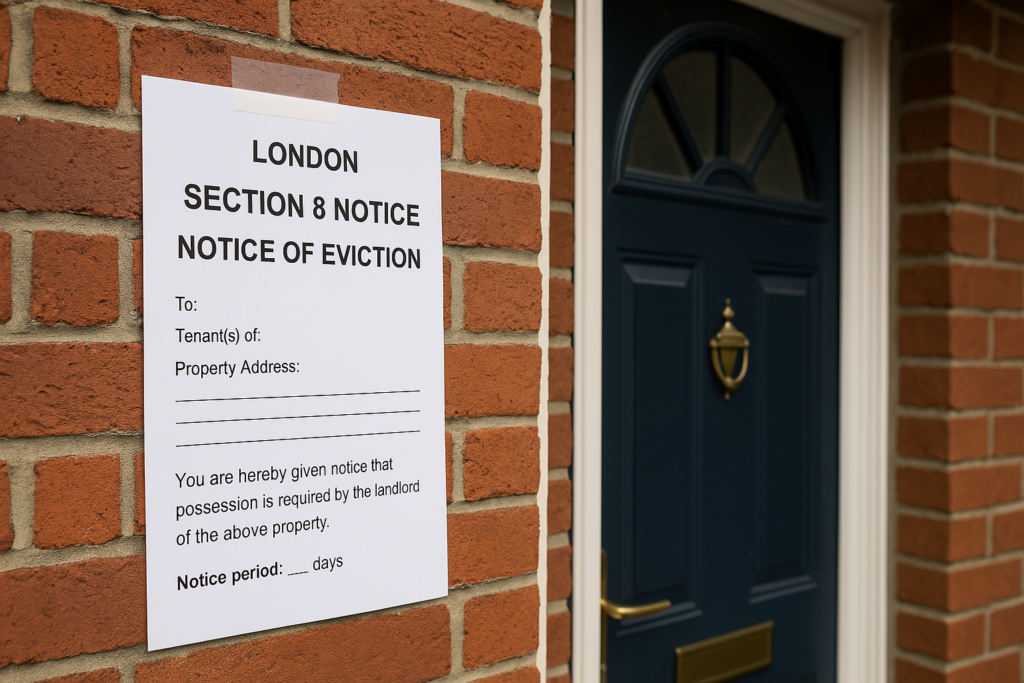As professional letting agents at London Estate Agency, we frequently assist landlords with legal compliance, including tenant notice periods in London.
Whether you’re regaining possession of your property, increasing rent, or transitioning to new tenants, giving the correct notice is essential to avoid costly disputes and legal complications.
Understanding Notice Periods: What Does the Law Say?
In the UK, and specifically in London, the notice period required largely depends on the type of tenancy,
the reason for ending the tenancy, and whether the tenant has breached the tenancy agreement.
For most private landlords, the tenancy will be an Assured Shorthold Tenancy (AST).
There are two main legal routes to end an AST:
- Section 21 Notice – No-fault eviction (typically for regaining possession).
- Section 8 Notice – Used when the tenant has breached the terms of the agreement.
Section 21 Notice – Regaining Possession Without a Reason
A Section 21 notice is used when a landlord wants to take back possession of the property after the fixed term has ended or during a periodic tenancy, without needing to provide a reason.
How Much Notice Do I Need to Give?
Under current regulations, landlords must provide at least 2 months’ notice. However, the tenancy must meet certain legal conditions:
- Deposit must be protected in a government-authorised scheme.
- A valid EPC, Gas Safety Certificate, and How to Rent Guide must have been served.
- The property must have the required licensing, if applicable.
Failing to meet these conditions renders the Section 21 notice invalid. This is why we offer full tenant compliance checks as part of our lettings service.
Section 8 Notice – When Tenants Breach Their Agreement
A Section 8 notice allows landlords to seek possession if tenants break the terms of their tenancy agreement, such as:
- Falling into rent arrears.
- Causing damage to the property.
- Engaging in antisocial behaviour.
How Much Notice is Required?
The notice period varies based on the grounds used:
- Rent arrears (Grounds 8, 10, 11): Usually 2 weeks’ notice.
- Antisocial behaviour (Ground 14): Can be immediate.
- Other grounds (like persistent late rent): 2 weeks to 2 months.
Because Section 8 can lead to court proceedings, we strongly advise instructing professionals like us to serve notice correctly and manage the legal process.
Periodic Tenancies – Rolling Monthly Contracts
If the fixed term has ended and the tenant has stayed on without signing a new agreement, it becomes a periodic tenancy.
How Much Notice is Needed from the Landlord?
For periodic tenancies, you must give at least 2 months’ notice via a Section 21 notice, ending on the last day of a rental period.
We ensure all notices are timed and served correctly, reducing the risks of delays or tenant disputes.
Tenant Rights and Retaliatory Evictions
Landlords must ensure notices are not retaliatory, i.e., served because a tenant complained about disrepair.
Under the Deregulation Act 2015, courts can strike out a Section 21 notice if it follows a legitimate complaint.
To protect your position, we provide property inspections and handle tenant communication professionally to minimise risks.
FAQs Landlords Commonly Ask
Can I Give Notice Mid-Tenancy?
Only if there’s a break clause in the agreement, otherwise, you must wait until the fixed term ends or rely on Section 8 for breaches.
What If My Tenant Refuses to Leave?
You’ll need to apply for a possession order through the courts. If they still refuse, you’ll require bailiff enforcement.
We handle the entire legal process for our clients to avoid stress and delays.
How Can I Increase the Rent Instead of Ending the Tenancy?
Use a Section 13 notice during a periodic tenancy. We manage this process as part of our rent review services to ensure the increase is legal, fair, and well-communicated.
Do I Need to Give Notice If the Tenant Is Leaving?
No, but the tenant must provide the correct notice. For monthly periodic tenancies, the tenant must give at least one month’s notice, ending on the final day of a rent period.
What Happens If I Don’t Serve Notice Correctly?
Your notice may be deemed invalid in court. This can cause months of delays and lead to further rent loss.
That’s why many London landlords rely on our expert tenant notice service to get it right the first time.
How We Can Help Landlords in London
At London Estate Agency, we specialise in landlord protection and legal compliance.
From drafting robust tenancy agreements to serving Section 8 and Section 21 notices, we offer:
- Tenant Screening & Rent Protection
- EPC Certification
- Market Rent Reviews
- Legal Eviction Support
- Full Property Management
- Access to cash buyers for quick sales
We understand that every landlord’s situation is unique. That’s why our tailored services ensure you remain fully compliant while protecting your income and assets.
Act Now to Avoid Costly Delays
Don’t wait for legal pitfalls to appear. Instruct London Estate Agency today to ensure your tenant notices are served correctly, timely, and legally compliant.
We offer same-day instruction, handle all paperwork and tenant communication, and represent you in court if needed.
Let us handle the complexities so you don’t have to.





